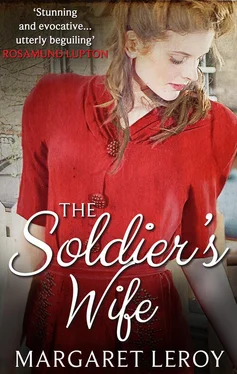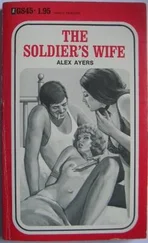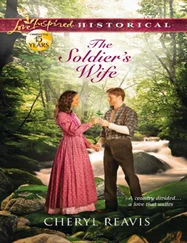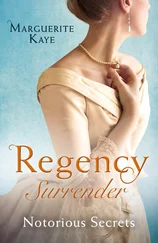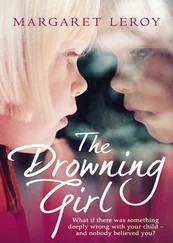Panic moves through me. Millie’s hand is so tiny and helpless in mine: everything feels so unguessably fragile, so opened up to disaster—the bodies of my children, the flimsy little boat. I have to protect my children, I have to keep them safe; but I don’t know how to do that. I think of the boat, packed tight with all these people, edging its way across the wideness of sea, all that shining waste of water between us and Weymouth; of the dark secret threat that lurks in the depths of the sea.
I’m scarcely aware of the moment of decision—as though I perform the action almost before I think the thought. I find myself pulling Millie out of the queue, dumping the bags down beside her.
‘Stay there,’ I tell her.
I go to grab Blanche’s arm.
She’s startled. She turns to me jumpily.
‘Mum. What on earth are you doing?’
‘We’re going back home,’ I tell her.
She ignores what I say, or doesn’t hear me.
‘Mum.’ Her voice is splintered with panic. ‘We’ll lose our place in the queue.’
‘We’re going home,’ I say again.
‘But, Mum—you said we had to go now , or we couldn’t go at all.’ Her eyes are wide, afraid.
Millie tries to pick up her carpet bag, but she’s only holding one handle. The bag falls open and all her things tumble out—her knickers and liberty bodices, her candystripe pyjamas, her beloved ragdoll—all her possessions, intimate, lollipop-bright, spewing out all over the grubby stone of the pier. She starts to cry—shuddery, noisy sobs. She’s frightened and cross, and ashamed that she made the things spill.
‘Shut up, Millie. You’re such a crybaby,’ says Blanche.
Millie, outraged, sobs more loudly. There’s a slight cold drizzle of rain.
I gather up Millie’s things and try to brush the dirt off them. Everyone’s eyes are on me.
‘Mum, you can’t do this,’ hisses Blanche, in an intense whisper. She’s torn—desperate to make me listen, yet mortified at being involved in such a public scene. ‘We’ve got to get to England.’
‘The boat’s too small. It isn’t safe,’ I say.
The rain comes on more heavily. Rainwater soaks my hair, runs down my parting, runs down my face like tears.
‘But nothing’s safe any more,’ she says.
I have nothing to say to that.
‘And I want to go. I want to go to London.’ Her voice is shrill. ‘You said we were going to go. You said. ’
I’m trying to gather up Millie’s things.
‘Blanche, for God’s sake, just grow up. This isn’t all about you. Can’t you think of somebody else for once?’
Immediately I’ve said it, I regret it. I shouldn’t have told her off like that. I have snatched her dream away from her: I know she’s upset, and afraid. But the words hang between us, sharp as blades, and I can’t take them back again.
I straighten up, put my hand on her shoulder. She shakes me off and stands a little aside, as though she is nothing to do with us. Her face is a papier maché mask: it’s set and white and looks about to dissolve.
I usher them back, past the queue of people. I don’t know how to get home, I haven’t thought this through, haven’t thought beyond this moment—just wanting to turn my back on the boat, the journey, the treacherous heave and shine of the sea.
We walk along the Esplanade, heading away from the pier. I don’t know if there are any buses going to St Pierre du Bois. Maybe all the buses are busy bringing the children here, to the harbour. The mist and rain are blowing in so you can’t see far over the water, the horizon edging nearer, everything closing in, closing down. They’ll have a wet, choppy crossing.
And then, with a rush of relief, I see a vehicle I recognise: it’s Angie’s brother, Jack Bisson, in his ramshackle van. Jack works as a handyman; like Angie, he’s resourceful, he can fix anything—burst pipes, loose slates, a cow that’s struggling to calve. I wave, and he comes to a stop beside us and winds his window down.
‘We were going to go and then we decided not to,’ I say.
‘ She decided not to,’ Blanche mutters behind me. ‘Not us. Her .’
Jack has quick dark eyes like a sparrow and Angie’s warm wide smile. His bird-like gaze flits over us. He nods, accepting what I’ve said.
‘Mr Bisson—I know it’s an awful lot to ask—but I don’t suppose you’re going our way? You couldn’t give us a lift?’
‘Of course I could do that, Mrs de la Mare. Just you hop in,’ he tells us.
He drops us in the lane just above Le Colombier.
We trudge down the lane towards our house.
There’s no sound but the rustle of rain on the uncountable leaves of the woods and orchards of the valley. Fat drips spill from the branches above us and soak our hair and our clothes, and I want to wipe the rain from my face, but I’m holding two bags and Millie’s hand and can’t brush the water away. Millie is tugging at me: she says her feet have blisters. All I can think is how much I want to get home.
We come to the wide five-bar gate that opens into our yard. The gate is unfastened. I must have left it like that—not noticing that I hadn’t fastened it in our rush to leave. But I’m surprised I was so careless.
I go to the door: it’s half ajar. I feel my pulse skittering off.
‘What’s the matter, Mummy?’ says Millie.
‘I’m not sure. You two can wait out here for a moment,’ I tell them.
‘Why?’ says Blanche. ‘It’s our home. And it’s raining, Mum, in case you hadn’t noticed.’
‘Just do as you’re told,’ I say.
My voice has an edge. Blanche flinches.
I step cautiously into the passage, then into the kitchen. Fear rushes through me. Someone has been here. Someone has broken into our house. My kitchen is wrecked, the cupboard doors flung open, my pottery jars broken, flour and raisins and biscuits all over the floor.
I call out.
‘Hello?’
My shrill voice echoes.
I stand silently for a moment and listen for running footsteps, my heart thudding. But the house has an empty, frail stillness: whoever did this has gone. I step warily into the living room. All my precious music is scattered, the sheets of paper like white petals from some great blossoming tree that a wind has shaken. The cabinet is open, and they’ve taken some of the china, and the Staffordshire dogs and the eggcups from the mantelpiece have gone.
The girls come cautiously into the house to find me.
‘No.’ Blanche’s voice is freighted with tears. ‘I told you, Mum. We did the wrong thing. We should never have come back,’ she says.
‘The Germans are thieves,’ says Millie severely. ‘I hate them.’
‘This wasn’t the Germans,’ I tell her. ‘The Germans haven’t come.’ I only just manage not to add yet. I swallow down the word.
‘It was the Germans,’ says Millie. It’s so simple for her. ‘They’re robbers. They’ve taken our china dogs. They shouldn’t have.’
‘No, sweetheart. It must have been someone who lives around here who did this.’
There’s the crunch of something broken, splintering under my feet. I kneel, pick up a china shard. It’s from one of the flowered teacups I brought all the way from London, that I always kept for best and only used for Sunday tea, because I was scared they might get damaged. Now, I see I was wrong: I should have made the most of the flowery cups while I could.
‘I bet it was Bernie Dorey,’ says Blanche. ‘I’ve seen him and his gang round here sometimes. He was in the same class as me at school, his family are all horrible. He used to nick my satchel and he never brushed his teeth.’
Читать дальше
